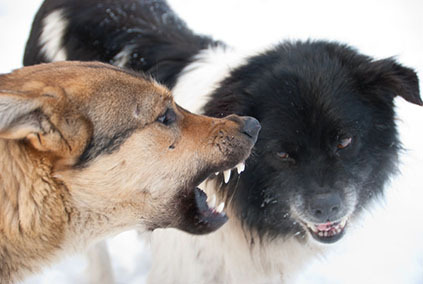Many of us whose family includes two dogs have set it up that way because we believe dogs enjoy canine companionship. When they're left alone, they're home together. And whether we're there or not, each has a friend to wrestle and play with, to lay around with--a hang-out buddy. But sometimes, despite our best efforts, the dogs don't get along. What begins as snarking over food or other resources (even the owner's affection can be a resource) may eventually turn into serious fights where veterinary attention is required. Some situations even turn deadly.
In the movie Sophie's Choice, Meryl Streep has an impossible decision to make. She must give up one of her children, knowing that it most likely means death for that child. While the owner of two fighting dogs' situation is not quite that dire, it is an extremely difficult decision. First, a behavior specialist should be brought in to make an assessment. Very often an owner believes that one dog is attacking the other without provocation, when in reality, the dog being attacked started it with a hard stare, curl of the upper lip, or other signal too subtle to notice unless one is looking for it. In some situations, it's possible that the owner can be taught to notice signaling and body language, and the dogs can be taught solid obedience skills to the point that the situation is manageable. A professional may be able to assist with behavior modification to resolve the issues. But that's not always the case, and homes can turn into canine war zones. Some people will choose to "crate and rotate" or otherwise manage the household so that the dogs never meet. This is a personal decision, as it requires the utmost constant vigilance and care--not to mention that it is exhausting. Still, it's a viable option for the sake of being able to keep both dogs. Unfortunately, sometimes there is no choice; the situation simply involves an unacceptable level of danger regardless, especially if there are young children involved.
Because giving up a dog is a highly emotional decision, many will put off even thinking about it until it's too late and major damage--physical and possibly mental/emotional as well--has been done. I often tell owners in those situations two things: One, think of it from the point of view of the dog who is being attacked. How would you feel if you were living in a home with someone who you knew meant to cause you harm, and perhaps even kill you? You would be in a state of constant stress. A dog who experiences chronic stress is at risk for gastric ulcers, atrophy of the lymphatic glands, and a compromised immune system. The latter, of course, opens the door for all sorts of illness and disease. So, even if your other dog doesn't cause major obvious physical injury, damage is still being done on a daily basis. The other thing I pose to owners is in the form of a question: How would you feel if you knew this situation was potentially very dangerous but did nothing, and then the worst happened? How would you live with yourself?
Often the owner wants to keep the "nice" dog. Who wouldn't? But the last time I heard someone say, "I'm looking to adopt a dog who might injure my other dog" was... never. Rescues are constantly overflowing, and certainly don't want to take in a dog who is potentially dog-aggressive. Now, in some cases where two dogs don't get along (female littermates, anyone?), the dog might be perfectly fine in another home with a different dog. But in cases where the dog is seriously dog-aggressive, choices are very limited, and that dog's best option is to stay in the home he has.
It's hard to make the decision to rehome a dog who hasn't done anything wrong, especially when there is a strong emotional attachment. Unfortunately, part of being a responsible owner is having to make the tough decisions that are for our dogs' own good, even if it causes us pain. But in the end, the pain we feel now is nothing compared to the benefits of creating a safe, loving road for the rehomed dog's life to take, and keeping everyone safe.
Nicole Wilde is a canine behavior specialist and author. Visit her website www.nicolewilde.com. Follow Nicole Wilde on Facebook.

